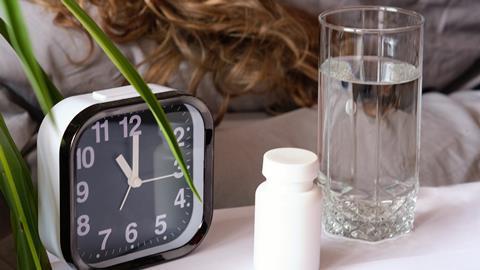As this time of year can be particularly challenging, Dr Becky Howie has some tips on how to regulate your circadian rhythm and boost your overall wellbeing
Oh, February – or as some of us refer to it, ‘DREAD-uary’. Why is it that the shortest month can often feel like it drags on forever?
It’s not surprising that you may feel flat at this time of year. The joyful lights and celebrations of Christmas are behind us, and spring still feels a long way off. You may find yourself longing for brighter days as you navigate through this darker, more challenging month. You’re not alone in feeling this way!
I live in the west of Scotland, where for a few weeks of the year we get ten more hours of darkness than we do of light. Not only are the daylight hours short, but the light levels are low, and grey tones often dominate the sky.
Did you know that exposure to daylight is essential for maintaining your health and wellbeing? An important part of your body, known as the circadian rhythm, is influenced by exposure to daylight. This is your body’s internal clock, which helps control when you feel sleepy or awake throughout the day. It’s a natural cycle that repeats roughly every 24 hours, telling your body when it’s time to sleep, eat or be active. It does this by stimulating secretion of some hormones while reducing others at various points over the 24 hours. Due to its impact on hormones, this rhythm also significantly impacts how you feel. Keeping your circadian rhythm balanced can help you feel better, sleep more soundly and improve your energy levels.
Tips for regulating your circadian rhythm
Here are some ways you can achieve balance, particularly during these darker months.
Create a routine Try to go to sleep and wake up at approximately the same time every day, including weekends, to maintain consistency. Keeping a regular sleep schedule helps keep your internal clock in sync, making it easier to fall asleep at night and wake up feeling refreshed in the morning. When your circadian rhythm is out of balance (if you stay up too late or change the time you wake up), it can mess with your sleep and mood.
Limit screen time before bed Many everyday devices like phones, tablets and TVs emit blue light, which can interfere with the secretion of an important sleep hormone called melatonin. Putting away your screens at least an hour before bed can help improve your melatonin levels.
Adjust lighting throughout the day Use bright lights in the morning (and even better, get outside in bright light, though this can be challenging in the winter months). In the evening, opt for dimmer, warmer yellow lights and reduce blue light exposure.
Engage in physical activity Try to get some exercise every day, ideally outdoors in bright light. Exercise boosts the production of endorphins, the ‘feel-good’ hormones, which can reduce stress and anxiety – common sleep disruptors. It also raises your body temperature, and as it gradually cools down afterward, it signals to your body that it’s time to rest. However, exercising too close to bedtime can interfere with sleep as intense physical activity increases your heart rate and stimulates your nervous system, which can leave you feeling more alert and make it harder to wind down. Try to finish any vigorous exercise at least three hours before bed, to give your body time to relax and prepare for sleep.
Avoid caffeine, nicotine and alcohol Caffeine, found in coffee, tea and some sodas, is a stimulant that keeps you awake by blocking adenosine, a chemical that makes you feel sleepy. Even a cup of coffee in the afternoon can disrupt your ability to fall asleep at night as it stays in your system for many hours. Nicotine, like caffeine, is a stimulant that can make it harder to fall asleep and stay asleep, as it raises your heart rate and keeps your mind alert. Alcohol might help you fall asleep initially, but it actually disrupts your sleep cycle by reducing the amount of deep, restorative sleep you get. It also increases the likelihood of waking up during the night. To get the best rest, limit these substances at least a few hours before bed.
Be mindful of napping If you need to nap, try to do so before 3pm and keep it short – ideally around 20-30 minutes. When you nap for extended periods, especially in the afternoon, you might enter deeper stages of sleep, which can make you feel groggy and disoriented when you wake up. This can interfere with your ability to sleep deeply at night, as your body might not be as ready for rest. If you’re feeling extra tired, try to nap earlier in the day to avoid impacting your nighttime routine.
By following these suggestions, you can support your circadian rhythm and enhance your overall wellbeing. To learn more about this topic, the Zoe Science and Nutrition podcast discusses it in one of their episodes: podcasts.apple.com/us/podcast/fix-your-body-clock-to-improve-long-term-health-with/id1611216298?i=1000659627088 (or search ‘fix your body clock Satchin’ on any podcast provider).
The impact of Vitamin D
During the winter months, the lack of sunlight poses challenges beyond just your circadian rhythm; it also
affects your vitamin D levels. Vitamin D, also known as calciferol, is crucial for overall health. Since one of our main sources of vitamin D is sunlight, and there is just limited availability of it in certain foods, you may risk deficiency over the winter months.
This vitamin is essential for strong bones, healthy teeth and proper muscle function. Additionally, it plays a role in reducing inflammation, supporting cell growth and strengthening the immune system. Therefore, it is important to ensure you maintain adequate vitamin D levels through the year.
Current advice recommends taking a vitamin D supplement of 10 micrograms daily from October to March. For the rest of the year, aim for 15-20 minutes of sun exposure daily, preferably between 10am and 3pm.
You should consider taking the supplement year-round if you belong to any of the following categories: are under age 5, have low sun exposure due to cultural or medical reasons that require you to cover up, are housebound, or belong to an ethnic group with darker skin such as those of African, African-Caribbean or South Asian descent, as they require significantly more sun exposure to produce sufficient vitamin D.
For more information about vitamin D, you can find several online resources from different organisations. Here is a link to the British Dietetics Association (BDA): bda.uk.com/resource/vitamin-d.html
Spiritual needs
After more than 20 years as a doctor, I have come to appreciate the wonderful complexity of our bodies. Our physical, emotional and spiritual health are all interconnected, and attempting to treat one without considering the others can lead to issues. Just as the human body depends on physical light for growth, energy and vitality, our souls require the spiritual light of Jesus to thrive.
Without sunlight, our bodies become weak, deprived of the essential nutrients and rhythms that sustain life. In the same way, without the presence of Jesus, the light of the world, our spirits wander in darkness, searching for direction and meaning. As he said in John 8:12: “I am the world’s Light. No one who follows me stumbles around in the darkness. I provide plenty of light to live in” (The Message).
As you navigate February, remember that your soul needs nourishment too. Make time to connect with Jesus; seek his presence and let his truth illuminate your path. In the same way the sun brings life to the earth, his light will renew your hope, guide your steps and provide the warmth your soul craves to thrive in every season.
Key takeaways:
How to keep your circadian rhythm in check for energy and vitality
- Stick to a consistent sleep routine
- Limit screen time in the evening
- Adjust your exposure to light throughout the day
- Stay active, especially outside in daylight
- Avoid caffeine, nicotine and alcohol
- Be cautious with your naps!
Taking vitamin D supplements
Between October and March it is advised that everyone take a vitamin D supplement of 10 micrograms. Some at risk groups should take this all year round (see main text for more information).

































No comments yet